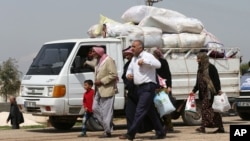Life is a challenge for the Kurds who left Kobani, Syria, and fled to neighboring Turkey in the face of a jihadist assault last year. The siege and stiff resistance combined with U.S.-led coalition airstrikes helped the Kurds keep their town from falling into the hands of the Islamic State, but left the center and large parts of the eastern neighborhoods destroyed.
Mustafa, a father of seven and a farmer, said only about 15 percent of the town’s population has returned. To do so, they need permission from Turkish authorities and town administrators, who are members of the dominant Kurdish PYD party. Unexploded bombs and rotting corpses are buried in the rubble, he said.
There is no water and no electricity, Mustafa said. In one street where there used to be 50 families, there are now just three. And he said the fighters with the YPG, an armed offshoot of the PYD, are doing what they like; there is no real administration, and the fighters decide what happens.
Mustafa said he was thinking of trying to reach Europe illegally, taking the risk of paying people-smugglers to board one of the so-called ghost ships from the Turkish port of Mersin. There is nothing for him and his family in Kobani now, he said. The town is not reorganizing, no one is doing anything for them and all his farming equipment has been destroyed. So he will try to make it to Europe and then call for his family to join him.
Mustafa said he was afraid of the trip and knew it would be dangerous; a relative of his drowned trying to reach Italy. He also said he was worried about how his family would cope once he reached Europe and applied for them to join him. Family reunification will take a long time, he acknowledged.
But he said there was nothing for him in Turkey. Jobs are hard to come by and the pay is low, and he wants his children to have safer and better lives than he has had.
His oldest daughter, Naima, doesn’t want her father to endure the dangers of the trip alone and is lobbying to go with him. She wants the opportunity to continue her studies and build a good life.
“Thinking that I will be better there make the scares disappear," she said. "I can handle with it and I am not so scared, I am not scared going there. There is no more life in our country, in Syria, in Kobani. The life that is there is done.”
Naima and her parents are not alone in saying that life is done in Syria. Talking with a group of Kobani Kurds in a Turkish border town, about half said they were planning to pay smugglers to get them to Europe.




